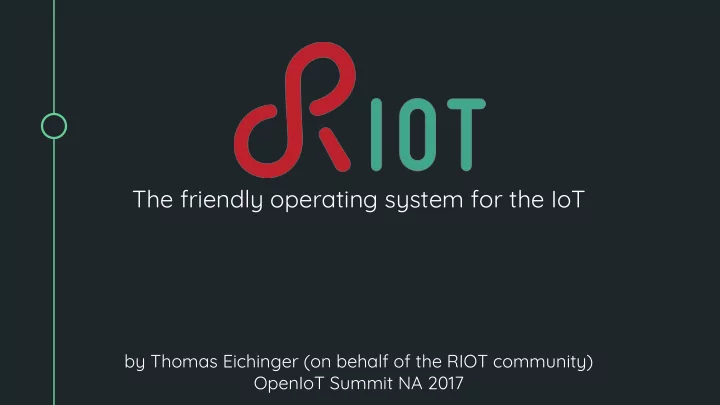

The friendly operating system for the IoT by Thomas Eichinger (on behalf of the RIOT community) OpenIoT Summit NA 2017
Why? How? What is RIOT?
Why? How? What is RIOT?
Why a software platform for the IoT? Linux, Arduino, … bare metal? ● But as IoT software evolves … ● More complex pieces e.g. an IP network stack ○ Evolution of application logic ○ … non-portable IoT software slows innovation ● 90% of IoT software should be hardware-independent ○ → this is achievable with a good software platform (but not if you develop bare metal)
Why a software platform for the IoT? faster innovation by spreading IoT software dev. costs ✓ long-term IoT software robustness & security ✓ trust, transparency & protection of IoT users’ privacy ✓ less garbage with less IoT device lock-down ✓
Why? How? What is RIOT?
How to achieve our goals? Experience (e.g. with Linux) points towards Indirect business models ● Open source ● Free core Geopolitical neutrality ● Driven by a grassroot community
Main Challenges of an OS in IoT Low-end IoT device resource constraints Kernel performance ● System-level interoperability ● Network-level interoperability ● Trust ●
SW platform on low-end IoT devices The good news: ● No need for advanced GUI (a simple shell is sufficient) ○ No need for high throughput performance (kbit/s) ○ No need to support dozens of concurrent applications ○ The bad news: ● kBytes of memory! ○ Typically no MMU! ○ Extreme energy efficency must be built in! ○
SW platform on low-end IoT devices Contiki mbedOS (ARM) ● ● Zephyr (Intel) ● ● TinyOS LiteOS (Huawei) ● ● myNewt … ● ● FreeRTOS and closed source alternatives ● ● Reference: O. Hahm et al. " Operating Systems for Low-End Devices in the Internet of Things: A survey ," IEEE Internet of Things Journal, 2016.
Why? How? What is RIOT?
RIOT: an OS that fits IoT devices IoT internet
Meet RIOT Free, open source (LGPLv2.1) operating system for the IoT ● Write your code in ANSI-C or C++ ○ Providing some POSIX features like pthreads and sockets ○ No IoT hardware needed for development ○ ■ Run & debug RIOT as native process on Linux
Why? How? What is RIOT? Kernel performance Connectivity Portability Trust
RIOT Specs Microkernel architecture (for robustness ) ● The kernel uses ~1.5K RAM on 32-bit architectures ○ Tickless scheduler (for energy-efficiency ) ● Deterministic O(1) scheduling (for real-time ) ● Low latency interrupt handling (for reactivity ) ● Modular structure (for adaptivity ) ● Preemptive multi-threading & powerful IPC ●
Architecture
Architecture Connectivity Portability
Why? How? What is RIOT? Kernel performance Connectivity Portability Trust
Connectivity ● Use what you need Flexible module based stack Many different PHY technologies ✓ (IEEE802.15.4, IEEE802.3, Bluetooth, NFC, serial, CAN bus) Interoperability tested IETF 6lo implementation ✓ IPv6 ✓ UDP, TCP ✓ COAP, MQTT-SN (in the making) ✓
Connectivity cont'd ● 3rd-party packages lwIP stack ○ uIP (emb6) stack ○ Thread (OpenThread) stack ○ ● Experimetal stacks CCN-Lite ○ NDN-RIOT ○
Why? How? What is RIOT? Kernel performance Connectivity Portability Trust
Portability ● Code your application once & run everywhere Various 32-bit platforms, but 16-bit and 8-bit platforms are supported ○ too (ARM, x86, MSP430, MIPS, AVR...) Independent from hardware vendors and their specific solutions ○ gcc standard toolchain, but llvm is usable too ○ ● Use existing libraries libcoap ○ micro-ecc ○ libfixmath relic ○ ○ lwip ○
Portability cont'd ● Easy porting of RIOT to new hardware periph Interfaces ○ Porting is a matter of hours or days ■ E.g. support for new ARM Cortex-M boards is `trivial` ■ Reusable *_common modules ○ Reduce code duplication ■
sys/* Posix sockets, pthreads ● (use familiar concepts) Shell ● (interact with your board via shell, use ps and ifconfig ) Crypto & hashes ● (aes, 3des, md5, sha1, sha256, …) C++11 ● Arduino ● (run your arduino sketch on RIOT) Cbor ● SenML ●
Why? How? What is RIOT? Kernel performance Connectivity Portability Trust
Trust Privacy? Security? if secured & understood, ● Reliability? IoT is positively ○ groundbreaking else ● IoT may be one of the ○ greatest threads in human IoT == challenging history
Some level of trust? Combining RIOT & Linux, IoT is possible with End-to-end open source ● End-to-end secure & open communication standards ● From anywhere in the Internet all to the way to (low-end) IoT devices ●
RIOT Roots & Evolution ● 2008 - 2012 Ancestors of kernel stem from research projects (FireKernel, uKleos) ○ ● 2013 - 2017 Branding of RIOT started, source code moved to Github, major ○ development of the network stack and the OS as such ● Speed evolution Of the codebase ○ Of the community ○
RIOT in Numbers ● 3690 commits in in 2016 ● ~150 contributors (~30 maintainers) ● 60+ boards ● 35+ MCUs ● 25+ Sensors ● 1 RIOT Summit ● 1 RIOT Foundation
RIOT Community Work ● Time based release model (3 months cycles) ● Roadmap, to help focusing on specific topics ● Task Forces (to work on specific topics) ● Open development process (github) ● Monthly Hack&Ack sessions ● Mailing lists ● IRC channel
RIOT in a nutshell Free, open source platform for portable IoT software RIOT offers a platform functionally equivalent to Linux, based on: Open source, Open-access protocol stacks Community driven development
Thanks for your interest! News: https://twitter.com/RIOT_OS For cooperation questions: riot@riot-os.org For developer questions: devel@riot-os.org Support & discussions on IRC: irc.freenode.org #riot-os
Recommend
More recommend